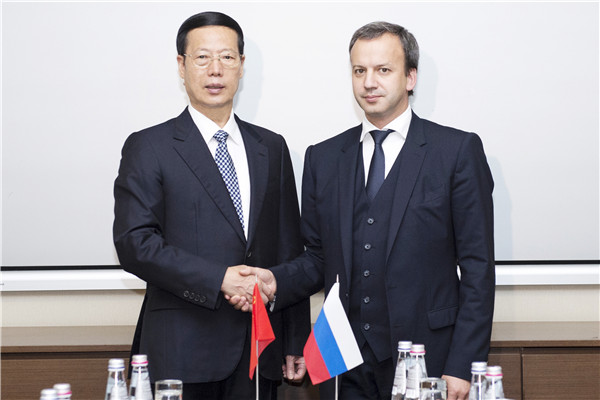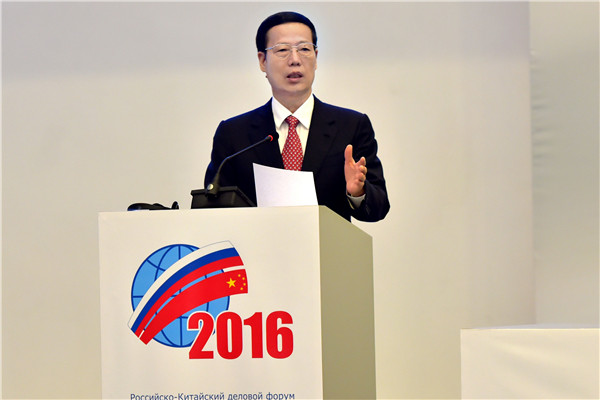
Vice-Premier Zhang Gaoli (L) and his Russian counterpart Arkady Dvorkovich meet in Sochi and co-chair the 13th meeting of the China-Russia Energy Cooperation Committee on May 30, 2016. [Photo/Xinhua]
SOCHI, Russia — Vice-Premier Zhang Gaoli and his Russian counterpart Arkady Dvorkovich agreed in Sochi on May 30 to enhance cooperation on energy and between small- and medium-sized enterprises (SMEs).
The agreement came as the two vice prime ministers co-chaired the 13th meeting of the China-Russia Energy Cooperation Committee and attended the second China-Russia SEMs Forum in Russia’s Black Sea resort of Sochi.

Vice-Premier Zhang Gaoli attends the second China-Russia SEMs Forum in Russia’s Black Sea resort of Sochi on May 30, 2016. [Photo/Xinhua]
During the energy meeting, Zhang spoke highly of the steady development of comprehensive strategic partnership of collaboration between China and Russia under the guidance of President Xi Jinping and Russian President Vladimir Putin.
He called for both sides’ concerted efforts to make preparations in the field of energy for the upcoming meetings between President Xi and Putin.
Zhang said the energy cooperation between China and Russia have expanded and deepened with smooth development on energy trade and substantial progress on strategic major energy projects since the 12th meeting of the energy cooperation committee was held in Beijing in November last year.
He encouraged both countries to consolidate confidence, further expand areas and models of cooperation so as to jointly build strategic ties of cooperation on energy that benefit both countries and peoples.
Echoing Zhang’s remarks, Dvorkovich said the comprehensive strategic partnership of collaboration between Russia and China has entered into a new stage.
Both countries support each other on key issues concerning sovereignty, security and territorial integrity, said Dvorkovich, adding that this is in line with both sides’ fundamental interests and development and Russia is satisfied with it.
The deputy prime minister said Russia is ready to work with China to forge ahead bilateral energy cooperation with more outcomes.
The two sides had an in-depth exchange of views on cooperation in the fields of natural gas, oil, coal, electricity, nuclear energy, technical equipment and renewable energy, reaching broad consensus.
After the meeting, Zhang and Dvorkovich signed the protocol of the meeting.
Energy cooperation is a core part of China-Russia cooperation. According to statistics released by China’s General Administration of Customs, in spite of a sharp decline in overall bilateral trade in 2015, Russia came as the second largest oil supplier to China last year with a volume of 42.43 million metric tons, up 28 percent compared with 2014, when China overtook Germany as Russia’s top crude oil consumer.
In his address to the SMEs forum, Zhang hailed the important role the SMEs have played in boosting economic growth and improvement of livelihood.
Calling SMEs “the driving force” of substantial cooperation between the two countries, Zhang said the cooperation among them enjoys a broad prospect and potential.
He called on both sides to promote the steady growth and structure optimization of bilateral trade, create new engines for economic innovation and new areas of cooperation through cooperation among SMEs.
Zhang said the Chinese economy has entered into a phase of “new normal,” but it is highly resilient and has much potential and ample space to grow.
Chinese economic fundamentals remain favorable for long-term growth, he added.
China will stick to the reform and opening up policy so as to create a fairer, more transparent, stable and expectable environment for companies from all countries, Zhang said, welcoming Russian companies to invest in China.
Dvorkovich, in his address, encouraged enterprises from both countries to take the opportunities of synergizing China’s Silk Road Economic Belt initiative with the Russia-led Eurasian Economic Union to seek new economic growth points in areas of energy, aviation, telecommunication, ship building, high-speed train, transportation, agriculture and cooperation in neighboring regions.
He promised that Russia will step up to lift barriers in the fields including policy access, intellectual property protection and taxation in the hope of creating better condition for both countries’ companies.
Also on May 30, Zhang met with Gazprom Chairman Alexey Miller.
